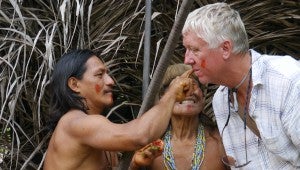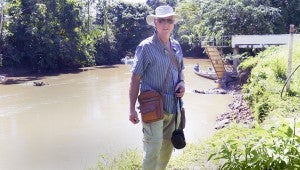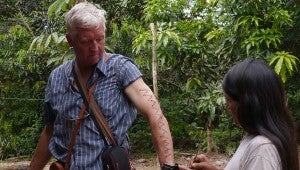ADVENTURE IN ECUADOR: Carter Sanders journeys where few have gone before
Published 2:00 am Saturday, October 17, 2015

Carter Sanders of Goshen purchased property in Ecuador after befriending and international student at Troy University. Sanders bought the property with the idea of growing cocoa but has decided to grown corn instead. Above, Waorani men paint Sanders’ face with war paint.
Carter Sanders of Goshen owns property in Ecuador.
All of that came about after he befriended an international student at Troy University who is from that part of the world.
Sanders bought the property with the idea of growing cocoa but has decided to grow corn instead.
But his fascination with Ecuador extends far beyond growing crops. Sanders is drawn to the intrigue of the vast jungles in northwestern South America, which has the most biodiversity per square kilometer of any nation.
Add mystery to intrigue and Ecuador is even more fascinating.
Ecuador was home to a variety of indigenous groups. One of these groups, the Waorani, remains uncharted within Ecuador’s 2.5 million-acre Yasuni National Park.
The more Sanders learned about Yasuni National Park and its people, the Waorani, the more fascinated he became.
“What most people would know about the indigenous groups of Ecuador is that five American missionaries were killed by one of the groups in 1956,” Sanders said. “There are now so few of these indigenous people because, until fairly recently, killing each other was their solution to any dispute. About 70 percent of the men of these indigenous groups died by being speared.”

Carter Sanders of Goshen purchased property in Ecuador after befriending and international student at Troy University. Sanders bought the property with the idea of growing cocoa but has decided to grown corn instead.
Today, about 400 Waorani live in a restricted area of Yasuni National Park.
“The most primitive of the Waorani, about 100 of them, live within what I would describe as the center of a donut,” Sanders said. “Few people go into the restricted area of Yasuni National Park. I wanted to be one of the few to go to the park’s donut hole.”
Sanders got his chance through the brother of a friend who is a Waorani princess. The man agreed to take Sanders with him to the park and into the restricted area via a water taxi.
An international health card was required to enter the park. The journey into the deep, deep jungle included a two-hour truck ride and then 12 hours by water taxi, which was nothing more than a motor canoe, Sanders said. Then it was another truck drive to the park area.
“Because we were in the deep jungle, I expected the virgin trees to be huge. They were tall but small trees,” Sanders said. “I have a ceibo tree on my property and it takes three people just to reach across it, not around it, across it. I expected jungle trees to be more like the ceibo.”
The Waorani living outside the donut hole were the major surprise of the jungle for Sanders in two ways.
“The Waorani were young, mostly 20-plus years and younger,” Sanders said. “There were some in their forties and only a few in their 70d and 80s. The indigenous people were fierce fighters and some tribes were headhunters. The older people had killed each other off so not many of them had survived.
“Another surprise was that the young Waorani were acclimated to our ways. They loved bottled drinks, sugar and store-bought bread. They had cell phones and computers. That was not anything I expected of indigenous people.”
But inside the donut hole, life was much as it was when the fighting was fierce.
The Waorani were nude and barefoot. They lived in thatch-roofed houses, cooked over open fires and were primarily bush hunters.
“I got to observe the ‘processing’ of a wild pig, fish for piranha and sleep in a hut in a hammock,” Sanders said. “The Waorani fear the jaguar and you don’t often see them but I got a chance to look a jaguar in the face. I saw monkeys and all kinds of jungle birds and reptiles. I was amazed at the biodiversity of Yasuni National Park. And the shame of it is that it’s all threatened by oil development.”
Sanders said oil drilling is underway in the wider parts of the park and it’s threatening to move closer to the “donut” where the Waorani are maintaining their way of life.
“When oil drilling begins, roads will come in, trees will come down and the Waorani’s way of life will forever be changed,” he said. “Yasuni National Park holds many world records of biodiversity. One part of the park area has a richer mix of trees, birds, amphibians and reptiles than the United States and Canada put together. All of this is threatened by oil development. Yasuni National Park is home to an estimated 800 million barrels of crude oil.”
Sanders met a Waorani man who spent 25 percent of his life in the “Stone Age.”
“Then, he went to New York to address the United Nations about the plight of the native people of Ecuador whose way of life is being threatened by oil development,” Sanders said.
“I can’t imagine what it would be like to come out of the Stone Age into today’s world. But, that is happening.
“For the most part the world of the Waorani people has already changed drastically. There are only 3,000 of them remaining and about 400 are in Yasuni National Park,” Sanders said. “There, they thought their world could remain unchanged. Those who live outside the donut hole are drinking colas and playing on computers. Those inside the hole are clinging to the old way of life.”
Sanders said he is fortunate to be one of the few who have been to the place where the Waorani people are maintaining a Stone Age way of life.
“I got to experience something very unique,” he said. “It was a once in a lifetime experience. When it was time to leave, I chose to fly out. I wanted to see the Amazon Basin. I wanted to see the trees that make up the deep, deep jungle. It was an amazing thing to see. The Amazon Basin is changing. The Waorani-way of life is changing and soon what I experienced will no longer be.”



